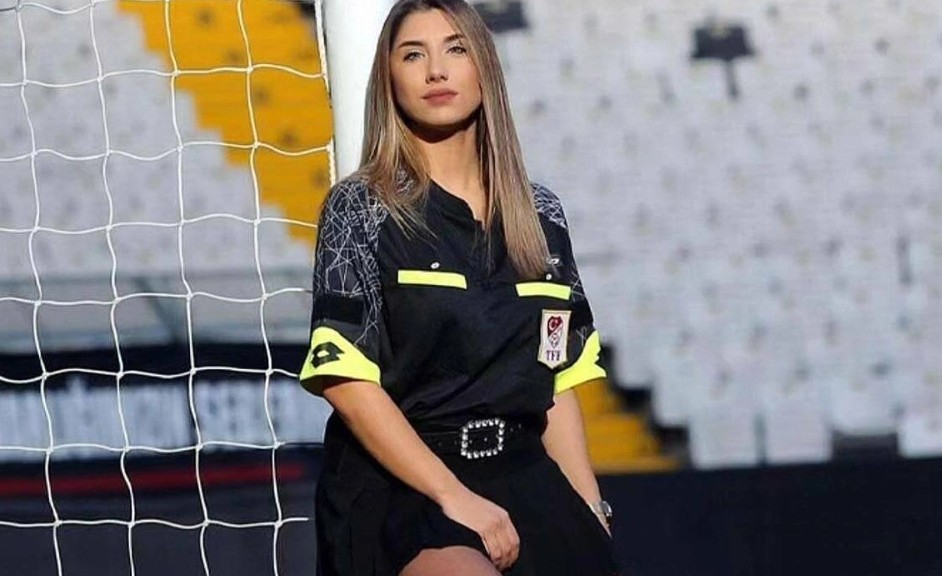In a shocking move that has sent ripples through the Turkish football world, the Arbitration Board of the Turkish Football Federation (TFF) has revoked the licenses of two well-known referees, Elif Karaarslan. This ruling not only prohibits them from officiating any football matches but also enforces a lifetime ban on their involvement in any football-related activities under the TFF’s jurisdiction. The severity of the decision underscores the seriousness of the allegations against them and marks a dramatic turning point in their professional careers.

Elif Karaarslan, a young and promising referee born on July 9, 2000, in Kadıköy, Istanbul, saw her rising career abruptly halted. The scandal stems from a series of explicit videos circulating on social media, allegedly linked to both Karaarslan and Erdemir. Despite Karaarslan’s firm denials and insistence that she had no connection to the content, the TFF Arbitration Board chose to revoke her license following their review of the evidence.
The ruling has sparked intense debate within sports circles and beyond, raising questions about privacy rights, the standard of evidence required for such severe sanctions, and the influence of social media on the personal lives of public figures. The controversy extends beyond the individual allegations, touching on broader issues of governance, ethics, and institutional power within sports. As the football community grapples with these challenges, the futures of two referees remain uncertain, highlighting the profound authority wielded by governing bodies in the world of sports.
Contents
The Rise of Elif Karaarslan and the Video Controversy
Elif Karaarslan, born on July 9, 2000, in Kadıköy a vibrant district on Istanbul’s Asian side was drawn to sports from an early age. Growing up in a city with a deep passion for football, she quickly developed a talent for the game. At just 16, Karaarslan began her professional journey when she was recruited by Beşiktaş Women’s Football Team, one of Turkey’s most prestigious clubs. This early experience allowed her to cultivate a strong understanding of football, refining her skills both on the pitch and in tactical awareness.
Leaked Personal Video of Public Figures Circulates on the Internet
Her playing career, however, was abruptly interrupted by a serious injury. At 20, Karaarslan suffered a devastating anterior cruciate ligament (ACL) tear an injury that often ends the careers of many athletes. Refusing to let this setback end her involvement in the sport, she transitioned from player to referee. In 2020, Karaarslan embarked on her officiating career, quickly earning recognition for her keen decision-making, deep knowledge of the game, and ability to manage matches with authority.
The Incident Leading to License Cancellation
Elif Karaarslan’s promising transition into refereeing appeared to mark a new chapter in her career until a scandal threatened to overshadow her achievements. Explicit videos allegedly featuring Karaarslan began circulating on social media, quickly becoming a viral sensation and sparking widespread debate about the private lives of public figures in sports.
In response to the controversy, the Turkish Football Federation (TFF) faced mounting pressure to act. Karaarslan vehemently denied any involvement with the videos, publicly defending her integrity and professionalism. She argued that the content misrepresented her and could have been maliciously used to damage her reputation a stark reminder of the darker side of public scrutiny and celebrity.

Despite her denials and the absence of conclusive evidence directly linking her to the videos, the TFF Arbitration Board took the drastic step of revoking her refereeing license. This ruling not only barred her from officiating football matches but also imposed a lifetime ban from all TFF-sanctioned activities. The decision triggered mixed reactions: some viewed it as necessary to uphold ethical standards in the sport, while others criticized it as excessively severe and potentially harmful to gender equality in football.
The controversy surrounding Karaarslan raises important questions about the tension between a public figure’s right to privacy and public interest. It also highlights the challenges faced by women in sports, whose actions both professional and personal often receive greater scrutiny than their male counterparts. As Karaarslan continues to contest the decision and seek a chance to restore her career, the incident underscores the vulnerabilities faced by individuals in the public eye.
TFF Arbitration Board’s Decision
The Turkish Football Federation (TFF) Arbitration Board cited breaches of professional and ethical standards as the basis for revoking the licenses of Elif Karaarslan. According to the TFF’s disciplinary code, any actions on or off the field that could harm the reputation of Turkish football are subject to strict sanctions. From the board’s perspective, the association of both referees with the scandal, regardless of their direct involvement, warranted decisive action to protect the sport’s integrity.
The board emphasized the importance of maintaining public trust in the fairness and ethical standards of football officiating. They argued that having referees linked to such controversies could undermine confidence in impartiality and damage the credibility essential to the game. Consequently, revoking their licenses and imposing a lifetime ban was viewed as necessary to safeguard football’s image and deter similar incidents in the future.
Consequences of the Lifetime Ban
The lifetime ban imposed on Erdemir and Karaarslan goes far beyond ending their careers in refereeing. It prohibits them from participating in any football-related activities under the TFF’s jurisdiction, including officiating at any level, holding administrative or technical positions, or engaging in coaching or club management roles within Turkey. This measure effectively severs their ties to the professional community they had been part of for most of their adult lives.
Beyond professional exclusion, the ban carries profound social and psychological repercussions. It affects how both individuals are perceived by the public and their peers, creating potential challenges in rebuilding their professional identities. For Erdemir and Karaarslan, the ban requires navigating entirely new career paths away from the football arenas that once defined their public personas.
The ruling has also sparked broader debates about how sports governing bodies handle scandals involving personnel. While maintaining ethical standards is critical, critics argue that sanctions should be proportionate, consider the possibility of rehabilitation, and respect individual privacy. This case has thus not only ended two careers but also ignited discussions on ethics, personal rights, and organizational responsibility in sports.
Karaarslan’s Defense and Public Reaction
Facing severe allegations that threatened to derail her emerging refereeing career, Elif Karaarslan mounted a strong defense. She categorically denied any involvement with the explicit videos circulating online, asserting that her identity had been misused without consent. Emphasizing the absence of concrete evidence, she reaffirmed her commitment to the ethical standards expected of sports officials and highlighted the personal and professional toll the scandal had taken on her.
Public and media reactions to the TFF Arbitration Board’s decision were deeply divided. Some viewed the board’s action as necessary to protect the sport’s integrity, while others criticized it as excessively harsh, potentially undermining Karaarslan’s future. Coverage varied, with some outlets questioning the proportionality of the TFF’s measures and others advocating for stronger protections for individual privacy in cases involving public figures.
The Role of Social Media
Karaarslan’s social media presence played a central role in the escalation of the controversy. Active on platforms like Instagram under the username “elifkaraarslan_17,” she regularly shared insights into her life and career. While this engagement helped her connect with followers, it also exposed her to intense public scrutiny and amplified the viral spread of the scandal.
The incident highlights the powerful influence of social media on the personal and professional lives of public figures. In modern sports, where public perception and personal branding are critical, social media can quickly become both a tool for engagement and a source of crisis. For Karaarslan, what was once a platform for connection became a stage for controversy, illustrating how rapidly online content can impact real-life careers and reputations.
The case involving Elif Karaarslan, intertwined in a scandal that resulted in lifetime bans from the Turkish Football Federation (TFF), underscores critical issues at the intersection of sports, ethics, and social media. The board’s decision to revoke their licenses in the name of protecting the integrity of the sport raises important questions about striking a balance between upholding ethical standards and ensuring fair treatment and privacy for the individuals involved.
This incident carries broader implications for sports ethics and governance, highlighting the challenges that institutions face in the digital era. It underscores the urgent need for clear policies and protocols that both safeguard public trust in sports and protect the rights of athletes, referees, and officials when controversies arise particularly those magnified by social media.
As debates continue within the football community and the public sphere over the fairness and impact of the TFF’s decisions, key developments to watch include potential legal actions from Karaarslan and Erdemir, possible reforms in the TFF’s governance policies, and the evolving influence of social media on the reputations and careers of sports figures. While the story remains at a pivotal stage, its outcomes are likely to shape future approaches to ethics, privacy, and decision-making in sports governance worldwide.

